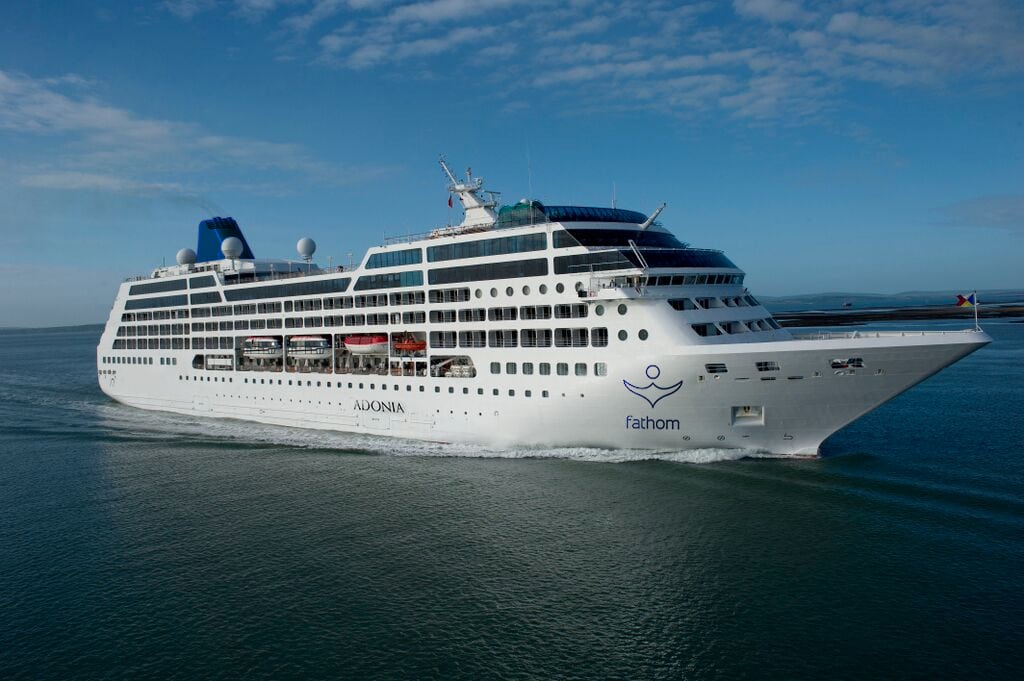Fathom Is Still Trying to Explain the Meaning of a Social Impact Cruise

Skift Take
When Carnival Corporation announced its newest brand in June — a one-ship line called fathom — the focus was so fixed on volunteer activities in the Dominican Republic that the world's largest cruise ship company didn’t even use the word “cruise” to describe the experience.
As the date for the first sailings approach in April, much has changed. The lower-case f has been replaced by a capital letter, for one, and executives are now calling the voyage a cruise (with the caveat that there are no Broadway shows or casino games).
“We say we’re a different kind of cruise for people who want to make a difference,” said Tara Russell, president of Fathom and global impact lead for Carnival Corp. "We think of it almost as cruise-plus today and we think of it as almost all-inclusive."
And, in a game changer for the travel industry, the U.S. and Cuban governments have been moving for more than a year to normalize relations, making travel to the island nation easier. Carnival announced in July that Fathom would start sailing between Miami and Cuba under the kind of people-to-people trips that the U.S. allows in May. Authorities in Cuba have still not given approval for the voyages.
So Fathom has some work to do: The line needs to communicate the idea of a kind-of cruise with activities that revolve more around pouring concrete floors, planting trees, and teaching English than snorkeling, shopping, and sipping rum runners. They must identify customers who would value that experience enough to pay a starting price of $974 per person, significantly more than a traditional weeklong Caribbean cruise. And Fathom has to persuade travel agents to promote cruises to Cuba for more than $1,800 a person even before the government gives its OK.
“We’re busy, as you can imagine,” Russell said. “We’ve got lots of things coming together for the first time ever. It’s intoxicating and exhilarating as well as daunting and challenging in a lot of different ways.”
By one measure, according to Carnival Corp. CEO Arnold Donald, Fathom is already a success for a company that has been beset for years by bad press about everything from accidents at sea to ship-stranding fires to stomach illnesses.
“Fathom has been unbelievable successful for us from an impression media standpoint,” Donald said during an interview last month. “It helped us keep cruise in the conversation in a positive way, and of course that helps all of our brands.”
Fathom wants to do more than earn positive ink. The company wants to be a force for change along with partner organizations, while making a profit for its publicly traded parent company. Eventually, Russell said she hopes Fathom will even have a presence on sister cruise lines.
“You might expect to find when you’re on a Holland America ship, maybe you participate in an on-ground experience with Fathom in the Dominican Republic,” she said. “Maybe when you’re on a Seabourn trip, you’ll have an opportunity."
Russell said the line could also grow enough to need more ships, which would likely be older, smaller vessels in the Carnival Corp. fleet. Fathom is using Adonia, a 710-passenger vessel built in 2001 that has been sailing with P&O Cruises.
But first: Get people to the Dominican Republic. Even before the ship is ready to sail from Miami, Fathom is flying travel agents, travel press, target customers, and others to the country to let them experience the hands-on activities.
Eric Goldring, a New Jersey travel agent who specializes in luxury, returned from such a trip recently with his 16-year-old daughter. They helped locals learn English, poured a concrete floor, planted mangroves, made water filters — and "loved it." Goldring, 57, said he thinks multi-generational travelers will embrace the option.
"I think a lot of people are really interested in it. They think it’s really cool. But they want to know what the heck it is," he said. Goldring described the experience in detail on his blog and said in an interview that he offered feedback during the trip about brochures, equipment, and other parts of the volunteer activities.
"I don't see this as like it's a new Royal Caribbean ship everybody wants to go on," Goldring said. "It's not that kind of product. Just like with the programs, it’s going to be an education process. I see it more starting slower than they would like but then building."
Goldring Travel, his agency, is a member of Ensemble Travel Group, which was the first consortia to bring Fathom on as a preferred supplier.
Ensemble co-president Libbie Rice said the company saw potential for interest from multigenerational families and travelers seeking unique experiences that let them give back — as long as that's actually how the trips play out.
"I think what it comes back to is it’s a different type of person who wants to do this vacation," she said. "It’ll be interesting to see the feedback of if people reach their goal to feel like they were really giving while they were there."
In addition to travel agents, sales representatives are working with universities, churches, alumni organizations, service clubs, and other groups that they have targeted as likely Fathom passengers.
"We’ve also found it challenging at times to get to that impact consumer because they aren’t as organized in one place as any of the other traditional sales channels," Russell said.
Ron Fenska, who was named vice president of sales in the first week of January, set up a booth at the New York Times Travel Show with a team that same week to connect with agents, press, and consumers.
"The reaction that we ended up getting was much better than I originally thought," he said. "I really was curious to see who was wrapped around this brand, did they understand the concept, and would it be relevant for them."
Fathom initially identified millennials, families, and older adults with disposable income as the travelers most likely to gravitate to the model. Russell said web traffic, social media engagement, and bookings have been "fairly consistent" with the research.
No one within Carnival Corp. would disclose details about Fathom bookings, but Russell said early sailings would include a "very representative sample of what we believed our target customers to be."
From his conversations with agents, Fenska said he believes brand awareness is growing.
"Most of the people have some back to say 'We are promoting this, we're actively out there in the marketplace, our pipeline for both the Dominican Republic and Cuba are fairly good,'" he said.
He and Donald both expect to see more bookings for the Cuba trips, which are scheduled to visit Havana, Cienfuegos, and Santiago de Cuba, once the government there gives its approval.
Russell said last week that she expects to be able to say more about the Cuba voyages "in the very short near term."
"We’re very, very positive and we’re very pleased with the progress that we’re making," she said. "There has not been an overall, high-level blanket approval that has been given to Fathom or Carnival Corp. However, we have made an enormous amount of the on-the-ground, tactical and berthing and all the important operational details progress."
She said the company has prepared for a worst-case scenario, but expects the best.
"We are very, very confident and do not plan to enlist any of those alternatives plans and options," Russell said.




